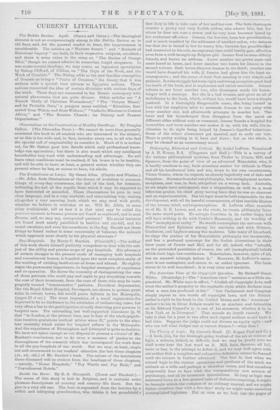• Beside the River. By R. S. Macquoid. (Hurst and
Blackott.)— The scene of this story is laid in Belgium, and it contains some pleasant descriptions of country and country life there. But the plot is a very old one. The hero is separated from the heroine by a selfish and intriguing grandmother, who thinks it her grandchild's first duty in life to take care of her and her cow. The hero thereupon marries a pretty and very foolish widow, who adores him, but for whom ho does not care a straw, and he very soon becomes bored by her exuberant affection. Jeanne, the heroine, loses her grandmother, and is much troubled by the addresses of another suitor, who assures her that she is bound in law to marry him, because her grandmother had consented to his suit, an argument that could hardly gain affection even from a well-brought-up Belgian girl. Joanne floes to some elderly friends, and leaves no address. Lover number one grows more and more bored at home, and lover number two hunts for Jeanne in the second volume. Both lovers discover Jeanne in the third ; number one would have deserted his wife, if Jeanne had given him the least en- couragement ; and the scene of their first meeting is very simple and pathetic. But the struggle between right and wrong occupies a good deal too much of the book, and is unpleasant and rather mawkish. Jeanne refuses to see lover number two, who thereupon sends his house- keeper with a message. But she is -a bad woman, and gives an air of melodrama to the book, which, without her, would have been a simple pastoral. In a thoroughly disagreeable scene, she, being herself in love with her employer, tries to persuade Jeanne to run away with lover number one, and afterwards attempts to murder her. The lover and his housekeeper then disappear from the novel on different aides without note or comment, Joanne founds a hospital for incurables, and lover number one makes it up with his wife, his in- clination to do right being helped by Jeanno's dignified behaviour. Some of the minor characters get married, and so ends our tale. There is pretty writing in it, hero and there ; but on the whole, it may be classed as an unnecessary novel.


































 Previous page
Previous page